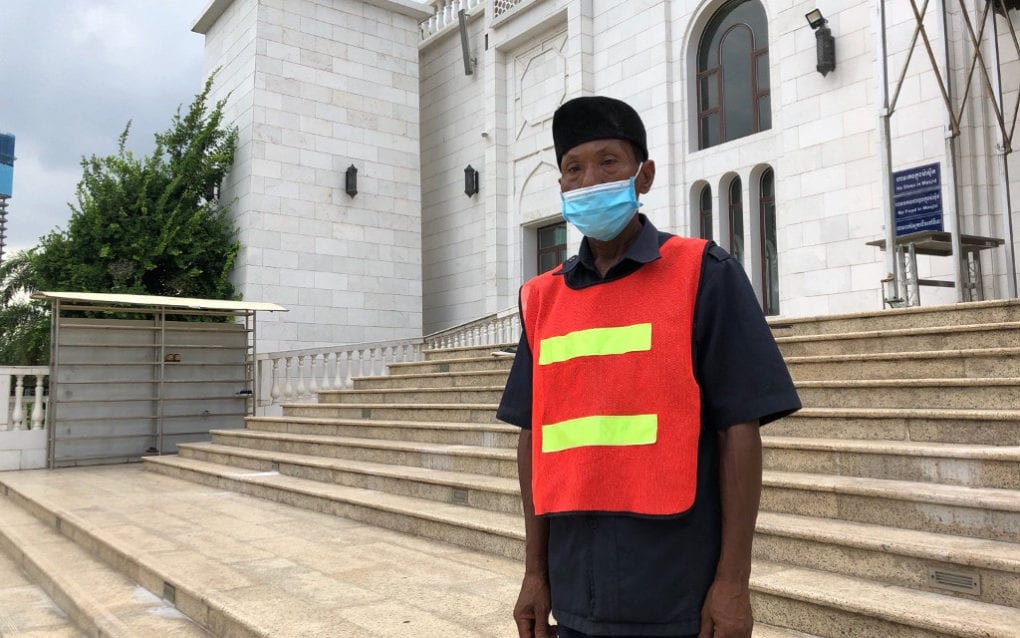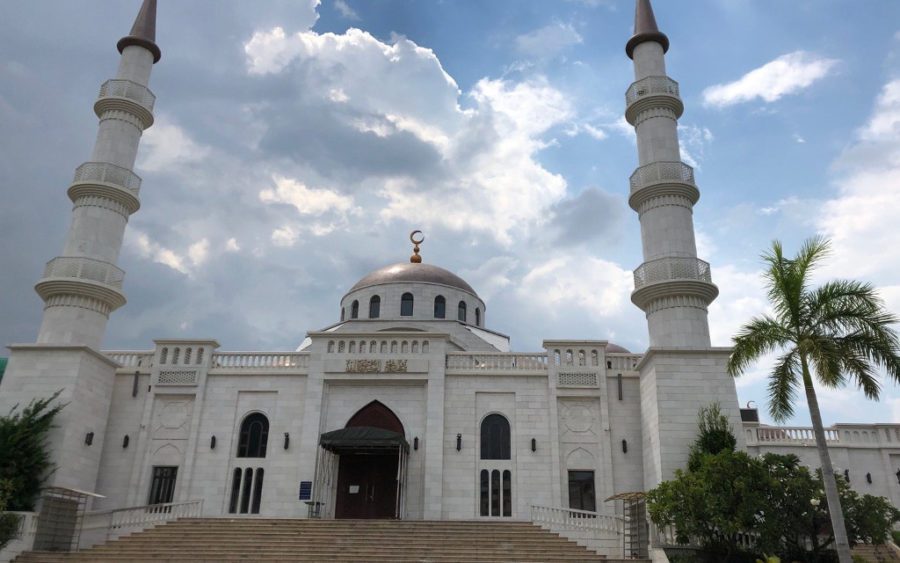At Phnom Penh’s Al-Serkal Mosque, the faded paper notice announcing the closure of the mosque due to coronavirus concerns was still affixed to the front door. But despite the sign, the door was reopened to worshippers for the first time in six months on Friday.
More than 400 Muslim faithful sat about a meter apart inside the mosque, with strips of red tape on the carpeted floor marking where praying individuals should sit to ensure a safe distance from others.
About 100 others prayed on the landing of the mosque in Daun Penh district’s Boeng Kak neighborhood, using their own prayer mats, said 60-year-old security guard Sem Ahmad.
“Before Covid-19, there was no distance from each other,” said Ahmad of those who used to pray shoulder-to-shoulder inside the mosque.
When authorities announced a ban on religious gatherings nationwide in mid-March due to fears of coronavirus transmission, Ahmad said some people who didn’t hear about the closures came to the mosque anyway. He had to inform them that they needed to go home.
In the past six months, the guard, who has worked at the mosque for about 20 years, said he has kept busy by keeping the grounds clean. On Friday, when he wasn’t assisting with the service and motorbike parking, Ahmad went inside the mosque.
“It was not too busy so I spent time praying,” he said.

The Health Ministry announced last week that mosques would be allowed to reopen to worshippers on Friday at 30 percent of their usual capacity.
Worshippers will be required to follow ministry guidelines, including wearing face masks, undergoing temperature checks, using hand sanitizer and maintaining social distancing of at least 1.5 meters, Health Minister Mam Bunheng said in a statement.
“Muslims should bring their own prayer mats from home,” Bunheng said, adding that the prayer service should not last longer than 30 minutes and the faithful must leave the mosque within 30 minutes of the service’s conclusion.
The ministry said mosques should follow the precautions starting Friday for three additional weeks before officials would reevaluate the situation and decide whether to relax restrictions.
For the second time this year, the Health Ministry declared there were no active coronavirus cases in the country, according to a statement on Friday. In mid-May, the ministry said all 122 Covid-19 patients at that time had recovered. More than double that number — 274 people — have now been reported recovered from the virus.
After the Friday service, outside the mosque, Math Vasot, 26, held his own prayer mat. The motorbike salesman said the last time he had prayed inside Al-Serkal was right before the March closures.
“Even before the pandemic we had to bring [our own mat] along with us in case we need to pray outside,” Vasot said, explaining that the mosque did not provide them.
With his family in Tbong Khmum province, the Russei Keo district resident said he had been praying at home alone during lunchtime when he was free.
“I don’t feel sad or lonely or anything because I know the authorities closed the mosque to prevent the virus,” he told VOD. “I also don’t want it to spread to me.”
Some mosque volunteers were collecting worshippers’ names and phone numbers in case anyone later tested positive for the virus and officials needed to conduct contact tracing, according to Vasot.
Before the pandemic he would see almost double the number of people come to the mosque for noon prayers, he said.
“I will come [to the mosque] next week and every week if Covid-19 is under control like it is now,” he added.
Another worshipper, 28-year-old accountant Yep Sary, was walking around the mosque grounds after the noon service, holding his squirming 2-year-old daughter.
“I knew today the mosque opened, so I came to pray as well,” Sary said. He lives in Tbong Khmum province and was visiting the capital for the day.
The last time he remembered praying in public was likely in February at Al-Serkal, he recalled, adding that prayers were now very different than the past due to social distancing requirements.
While Islam viewed harm to oneself and others, such as risking infection, as a sin, Sary admitted that it felt good to pray near other Muslims at the mosque and see how people were doing.
“When we pray, God is always close to us,” he said.
Before collecting a few pairs of shoes and sandals left behind on the steps by worshippers after the noon service, the guard Ahmad said the coronavirus situation in Cambodia was under control compared to other countries. But if the tide changed, infections spread and authorities again ordered the mosque closed, he would be happy to oblige and again shut the door.
But for now, Ahmad was keeping the faith.
“I feel warm inside and safe because I believe Allah keeps Muslims and Cambodia safe.”













